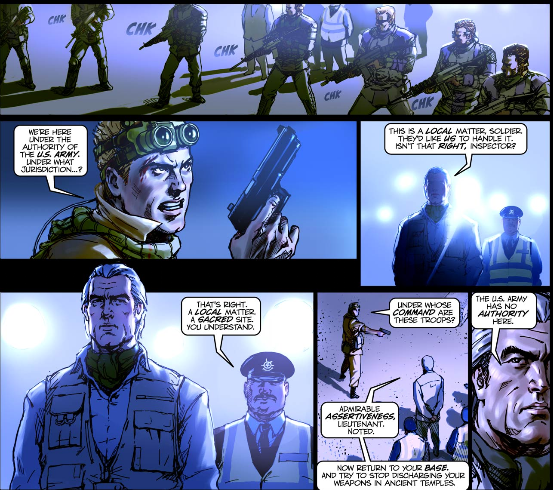
Douglas Rushkoff talks about his participation in the making of Exoriare:
I’ve written and even taught a whole lot about interactive narrative over the years, but rarely have the chance to play with this stuff. So last year, when a Canadian games company rang to see if I’d be interested in collaborating with them on developing stories for a giant, multi-dimensional gaming universe, I jumped. It was like I was being given the chance to live out Jack Kirby’s dream of world-building with Robert Anton Wilson’s vision of multiple and overlapping perspectives.
The early results are finally making it online as the preview of a graphic novel, which spills out into the trailhead of at least one Alternate Reality Game, and also comprises the back story of the coming videogame series. This is a big big universe – a giant war for the future of humanity, of course – with maybe one overall timeline but many different pathways through the material. So people might follow my characters through a series of graphic novels, and learn something about them that they can then use in the games, or an artifact they find in the game might help them decode something in the comics. And even the ARG that people are beginning to play right now – through which they are “finding the others,” and forging coalitions with other gamers in their own parts of the world to solve certain challenges – is a set-up for the bigger game, where these larger groups will be responsible for various aspects of the coming war.
The object of the game right now is for the players to build the “Darknet,” an alternative network through which a global resistance can operate, and people can begin to piece together why NASA scientists are being rounded up and what the hell happened over the skies in Los Angeles.
From the Boing Boing comments section:
“Looks absolutely brilliant. I see that Telefilm Canada is on board. Interesting. I never knew they dealt with video game production.”
– BattyMcDougall
It’s a seemingly grand idea: link/crossover static literary content with fluid/dynamic, player-generated game developments. Not sure how successful they’ll be at it, though. It smacks of one of those ideas that looks good on paper, but falls apart in practice. But who knows? Maybe they’ll actually be able to pull it off.
Here’s hoping…